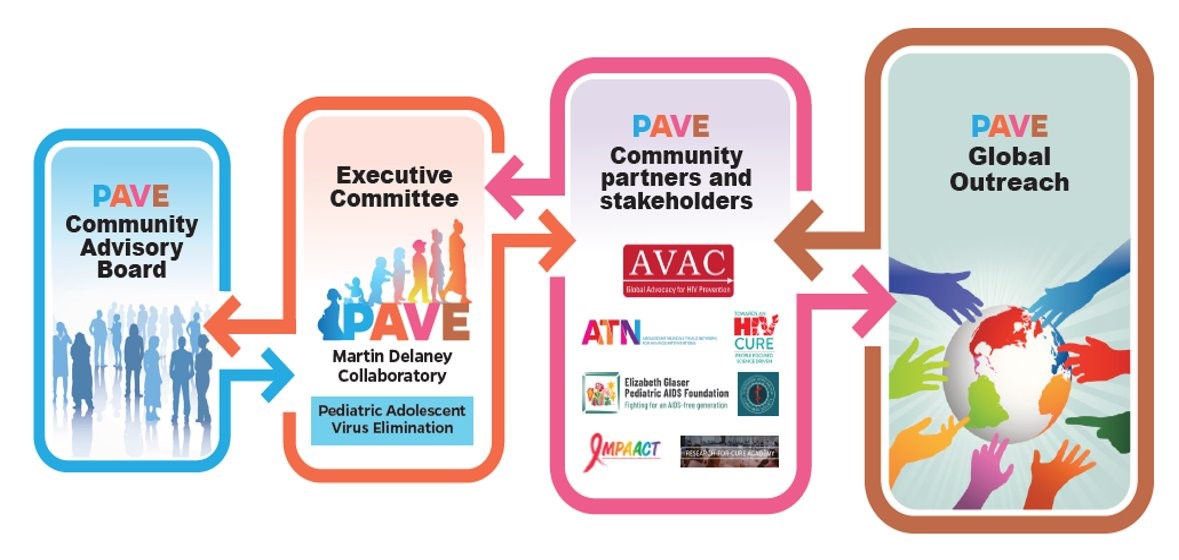Community Engagement
The PAVE MDC Community Engagement plan encompasses integration, education, dissemination, and amplification through close bidirectional interactions between the PAVE Community Advisory Board, Community Partners, and the Executive Committee (EC) in developing the scientific agenda, vetting with key stakeholders and partners, and leveraging partners for dissemination and amplification
We hypothesize that early, regular, bidirectional engagement with domestic and international communities impacted by perinatal HIV-1 infection, along with key partners and stakeholders, will enhance cure literacy and understanding and inform the ethical, practical, and community perspectives to consider in developing cure clinical trial interventions.

Specific Aims
Aim 1: Community Participation in Research
Strengthen ethical conduct of pediatric HIV cure research through community participation
Aim 3: Build Diverse Advocate Cohort
Build a diverse, representative of advocates who can contribute to international dialogue around cure research
Aim 2: Increase Accessibility
Increase the number of accessible tools and resources related to HIV pediatric cure research
Aim 4: Identify Social and Behavioral Issues
Identify emerging social and behavioral issues related to pediatric HIV cure research
Innovation and Current Community Milestones
The 4 Aims of Community Engagement are being achieved through the following approaches and activities:
- Actively engaging members of the domestic and international communities affected by PHIV through regular and purposeful bidirectional dialogue
- The Community Advisory Board (CAB) was established and comprised of individuals representing key stakeholder groups important to PAVE: clinicians, parents and youth with PHIV. The community engagement coordinator met with strategic partners in Zimbabwe, South Africa, Uganda and the United States to introduce the PAVE collaboratory and get recommendations on potential CAB members. The IMPAACT CAB was also engaged during this period to ensure connections between basic and clinical research.
- The community core team is also committed to creating more opportunities for PAVE investigators to interact with community members. During year two, the partners will work on a “Community Voices” campaign that will highlight voices of different stakeholders impacted by PHIV cure to the different research foci.
- Developing partnerships with relevant stakeholders to build networks of informed advocates to influence the pediatric HIV-1 cure research agenda and Research and Development pipeline
- The community engagement coordinator met with several groups to introduce PAVE and determine areas for synergy and partnership. Groups like Zvandiri Africaid, Positive Women’s Network of East Africa, and The Well Project became strategic partners.
- PAVE investigators presented PAVE and the importance of PHIV cure research at several community events and conferences introducing the collaboratory and the research to new audiences.
- Leveraging existing programs to build the capacity of stakeholders to effectively communicate and engage with pediatric HIV-1 cure research.
- PAVE was able to partner with the Well Project, REACH and Iris House to host a couple of events focused on women’s perspective in HIV cure research. The events included presentations on motherhood and cure research in pediatrics.
- A baseline assessment survey was created and shared widely among core community partners and our larger partnership network. These findings helped develop a factsheet on perinatal HIV cure and guide the development of other HIV cure resources scheduled to be released in year two.
- SAHCS and Elizabeth Glazer Pediatric AIDS Foundation (EGPAF) conducted three webinars that introduced the PAVE collaboratory to healthcare providers (SAHCS) and a wider audience (EGPAF). The SAHCS platform provided a space for medical providers to learn about the latest research in perinatal HIV cure and ask questions to leading researchers. SAHCS developed a glossary for medical providers to help them discuss cure research with patients. EGPAF participated in community core meetings at PAVE and helped shape the community engagement workplan for PAVE.
Program Directors

Johns Hopkins University

Stellenbosch University
Community Engagement Coordinator
AVAC
|Community Engagement Coordinator